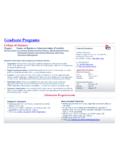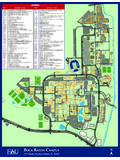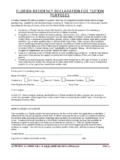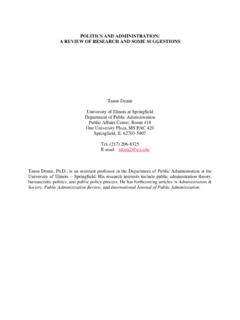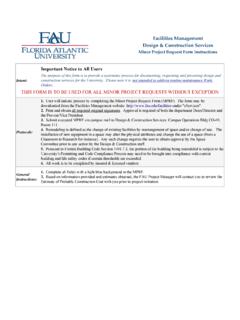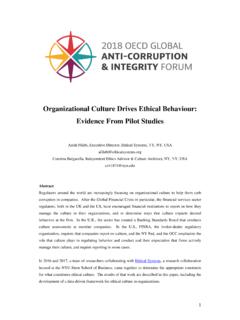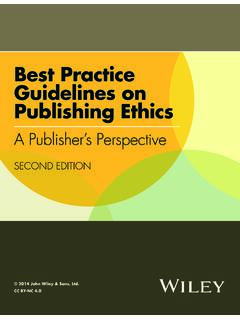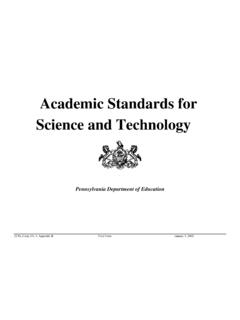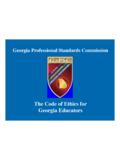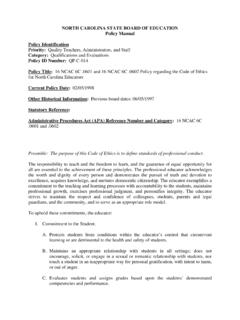Transcription of Florida Atlantic University
1 Florida Atlantic University Regulation code of academic integrity (1) Purpose. Students at Florida Atlantic University are expected to maintain the highest ethical standards. Dishonesty is considered a serious breach of these ethical standards, because it interferes with the University mission to provide a high quality education in which no student enjoys an unfair advantage over any other. Dishonesty is also destructive of the University community, which is grounded in a system of mutual trust and places high value on personal integrity and individual responsibility. (2) Definitions. The FAU code of academic integrity prohibits dishonesty and requires a faculty member, student, or staff member to notify an instructor when there is reason to believe dishonesty has occurred in a course/program requirement.
2 The instructor must pursue any reasonable allegation, taking action where appropriate. Examples of academic dishonesty include, but are not limited to, the following: (A) Cheating 1. The unauthorized use of notes, books, electronic devices, or other study aids while taking an examination or working on an assignment. 2. Providing unauthorized assistance to or receiving assistance from another student during an examination or while working on an assignment. 3. Having someone take an exam or complete an assignment in one s place. 4. Securing an exam, receiving an unauthorized copy of an exam, or sharing a copy of an exam. (B) Plagiarism 1. The presentation of words from any other source or another person as one s own without proper quotation and citation. 2. Putting someone else s ideas or facts into your own words (paraphrasing) without proper citation.
3 3. Turning in someone else s work as one s own, including the buying and selling of term papers or assignments. (C) Other Forms of Dishonesty 1. Falsifying or inventing information, data, or citations. 2. Failing to comply with examination regulations or failing to obey the instructions of an examination proctor. 3. Submitting the same paper or assignment, or part thereof, in more than one class without the written consent of both instructors. 4. Any other form of academic cheating, plagiarism, or dishonesty. (3) Procedures. (A) If the instructor determines that there is sufficient evidence to believe that a student engaged in dishonesty, the instructor will meet with the student at the earliest possible opportunity and provide notice to the student of the instructor s perception of the facts, the charges against the student, and the sanction.
4 The instructor may not remove the student from the course until the appeal process has come to a conclusion. (B) If, after this meeting, the instructor continues to believe that the student engaged in dishonesty, the instructor will provide the student written notice of the charges and the penalty. A copy of this statement shall be sent to the chair of the department or director of the school/program administering the course. (C) The student is entitled to an opportunity to be heard at a meeting with the instructor and chair/director to review and discuss the instructor s charges/statement. Such request for a meeting must be made in writing and received by the chair/director within five (5) business days of receipt of the instructor s charges/statement. The purpose of the meeting is to discuss the facts and to advise the student of the appeal process.
5 The chair/director will provide the student, the instructor, and the dean of the college administering the course a summary of both the student s position and the instructor s position. (D) The student may appeal in writing to the dean of the college administering the course. The appeal must be received by the dean within five (5) business days of receipt of the chair/director s summary from the review meeting. The dean will convene a Faculty-Student Council ( Council ), which will be composed of the dean (or designee), two faculty members, and two students. The dean (or designee) will act as chair of the Council, direct the hearing, and maintain the minutes and all records of the appeal hearing, which will not be transcribed or recorded. The hearing is an educational activity subject to student privacy laws/regulations, and the strict rules of evidence do not apply.
6 The student may choose to be accompanied by a single advisor, but only the student may speak on her/his own behalf. The student and instructor may present testimony and documents on his/her behalf. Additional witnesses may be permitted to speak at the dean s (or designee s) discretion and only if relevant and helpful to the Council. The Council will deliberate and make a recommendation to the dean to affirm or void the instructor s findings of academic dishonesty. The dean (or designee) will inform the student and instructor in writing of his/her findings of academic dishonesty after receipt of the Council s recommendation. (E) The student may request an appeal in writing of the dean s findings of academic dishonesty to the University Provost (or designee) and include relevant documentation in support of such appeal.
7 The University Provost (or designee) will notify the student, dean, and instructor of his/her decision in writing. This decision by the Provost (or designee) constitutes final University action. (F) If there is a finding that the code of academic integrity has been violated, the chair will notify the University Registrar that the following notation be included on both the student s official transcript and on the student s internal record: Violation of code of academic integrity , University Regulations If such violation is appealed and overturned, the dean or University Provost (or their designees) will notify the University Registrar that such notation should be removed from the student s transcript and internal record. (4) Penalties. (A) The instructor will determine the penalty to be administered to the student in the course.
8 Penalty grades cannot be removed by drop, withdrawal, or forgiveness policy. Students should be aware that, in some Colleges/programs, failure in a course or a finding of dishonesty may result in other penalties, including expulsion or suspension from the College/program. (B) In the case of a first offense, the student may elect to complete a peer counseling program administered by the Division of Student Affairs by the end of the semester following the semester in which the dishonesty occurred. Upon successful completion of this program, the notation regarding violation of the code of academic integrity will be expunged from the student s official transcript. The grade, however, will remain unchanged and cannot be removed by drop or forgiveness policy. Also, the notation will remain in internal University student records.
9 (C) In the case of a repeat offense, even if the notation of violation of the code of academic integrity from the first offense had been expunged from the official transcript as a result of successful completion of the peer counseling program, the student will be expelled from the University . Specific Authority: Article IX of the Florida Constitution, , , Board of Governors Regulations , , and History New 10-1-75, Amended 12-17-78, 3-28-84, Formerly , Amended 11-11-87. Formerly Amended 5-26-10.
